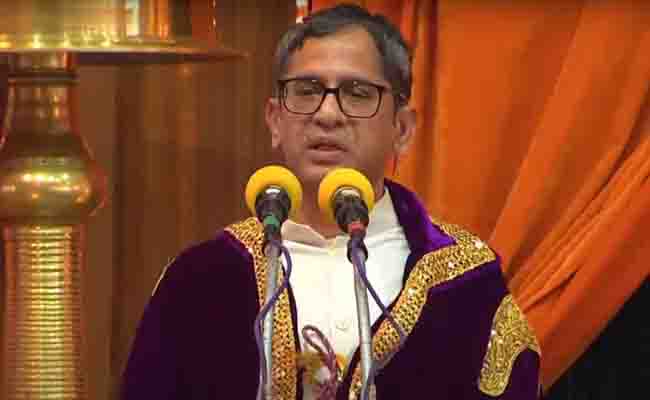news details |
|
|
| "In Instant Noodles Era, People Want Instant Justice": Chief Justice | | |  agencies agencies
NEW DELHI, Apr 23: Chief Justice of India NV Ramana on Saturday said that the biggest issue affecting all institutions nowadays, including the judiciary, is ensuring sustained faith in the eyes of the public, adding that in this era of instant noodles, people expect instant justice but they do not realize that real justice will be a casualty if we strive for instant justice.
Speaking at the foundation stone laying ceremony at Madras High Court, Chennai, CJI Ramana said that dispensing justice is not only a constitutional duty but also a social one.
The CJI said that judges should be aware of social realities and they have to carefully watch the changing social needs and expectations.
"Judges should be aware of social realities. We have to carefully watch the changing social needs and expectations. The world is moving very fast. We are witnessing this change in every sphere of life. From the 5-day test match, we have moved on to the 20-20 format. We prefer short duration entertainment over a 3-hour long movie. From filter coffee, we have moved on to instant coffee. In this era of instant noodles, people expect instant justice. But they do not realize that real justice will be a casualty if we strive for instant justice," he said.
The CJI further said that he has highlighted issues affecting the legal system during his tenure at the office.
"During the last one year of my tenure as CJI, I have been highlighting various issues affecting our legal system in India. The biggest issue affecting all institutions nowadays, including the judiciary, is ensuring sustained faith in the eyes of the public," CJI Ramana said.
The Chief Justice stressed on the duty of the judiciary to uphold and enforce Constitutional values.
"The judiciary is vested with the immense Constitutional responsibility of maintaining the Rule of Law and checking executive and legislative excesses. We have the duty of upholding and enforcing Constitutional values. It is no doubt, a heavy burden. But it is one that we have gladly chosen on the day we took our Constitutional oath. This is the reason why strengthening judicial institutions has been my top priority. Strengthening the judiciary is imperative for a democracy, sustained on the rule of law," he said.
The CJI termed the dispensation of justice "not only a Constitutional duty", but also a "social" one.
"Dispensing justice is not only a Constitutional duty but also a social one. Conflicts are inevitable for any society. But the constructive resolution of conflict is integral to maintain the social order," CJI further said.
"Constructive conflict resolution is not a mere technical job, he said, adding particularly in a country like India, judges cannot blindly apply the rules, procedures and statutes. "After all, conflicts have a human face. We are constantly aware of our duty to render justice, not merely procedural, but also substantial," he added.
CJI Ramana laid out the parameters that the judges have to look into before giving a verdict as the judiciary is like an "engine of social integration".
"Before rendering any decision, the judges have to weigh several socio-economic factors and the impact of their decision on the society. I firmly believe that the judiciary should never be viewed as a mere enforcer of the law. It is an engine of social integration. Judging is not an easy task," he said.
Suggesting judges to broaden their's horizons, he asserted,"We judges have to sharpen our ideas and perceptions, we need to expand our knowledge base and adopt technology as an enabler, he said. CJI further said that there cannot be a gap between the mind of a judge and the needs of society. "Ultimately, we are entrusted with the duty to deliver justice for all," he said.
Speaking about the people in general, the CJI said that they look up to the judiciary in times of distress and lay their faith in it to protect their rights.
"The people of this country look up to the judiciary in times of distress. They firmly believe that their rights will be protected by the courts. It is necessary to contemplate how to improve the functioning of the judiciary, and how to reach out to the people and fulfil their justice needs. This is precisely why I have been a strong proponent of the "Indianization of the Justice Delivery System". By Indianisation, I mean moulding the Indian Judicial System for the benefit of the Indian populace," he said. |
|
|
|
|
|
|
|
|
|
|
|
|
| |
| |
|
|
|
|
 |
|
|
|
|
STOCK UPDATE |
|
|
 |
| BSE
Sensex |
 |
| NSE
Nifty |
|
|
| |
CRICKET UPDATE |
|
|
|
|
|
| |
| |
|
|
| |
|
|
|
|
| |
|
|
|
|
|
|
|
|
|
|
|
|
|
